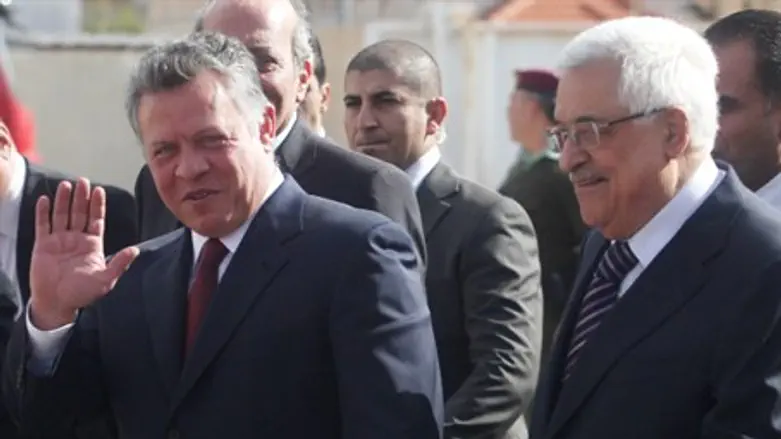
Jordan's King Abdullah II has announced that he intends to personally monitor the footage from cameras Israel controversially agreed to have placed on the Temple Mount, and that the footage will not be broadcast to Israel - except for segments Jordan decides can be seen by the world.
Prime Minister Binyamin Netanyahu agreed to let the Jordanian Waqf place the cameras on the Mount, the holiest site in Judaism, in a "gesture" to reduce tensions during the ongoing Arab terror wave. The Waqf remains in de facto control of the site and has banned Jewish prayer despite Israeli law stipulating freedom of worship, and the cameras are a tool in enforcing that ban.
In response to Abdullah's announcement, Agriculture Minister Uri Ariel (Jewish Home) has called on Netanyahu to cancel the camera initiative, even though Ariel's own party head Naftali Bennett supported placing the cameras, and further voiced his support for banning Jewish prayer at the Mount.
Ariel called to cancel the initiative until it is decided to place cameras in all corners of the Mount, including the mosques, and Israel is promised full access to the footage.
"Not installing cameras in the Al-Aqsa Mosque means immunity...for the rock hoarders and throwers from inside the Mosque. For the firecracker shooters, and all the inciters," he wrote in a letter to Netanyahu.
The Headquarters for Temple Organizations explained that Ariel's letter follows Abdullah's declaration that "the cameras will be brought from Jordan," and "cameras won't be installed inside the mosques."
Abdullah also said "a control room will be established in the Temple Mount managed by the Waqf, and from there the direct footage will be broadcast to the king's office."
"We're losing sovereignty"
"Abdullah's words to a delegation of people he invited to him from Jerusalem are most serious, and they signify and additional deterioration in the gradient of sovereignty on the Mount," wrote Ariel.
Ariel noted that all of the violence by Arab rioters, the incitement and the protests with flags of terrorist organizations "won't be filmed, and certainly won't be screened to the eyes of those in power in the Israeli government."
He added that Netanyahu's promise that the cameras would help arrest Arab rioters "are liable to be proven as having no true cover on the ground."
"Giving the possibility to the Kingdom of Jordan, a foreign sovereign state, to run security cameras in the Temple Mount, without any cooperation with the Israel Police, means one thing: an additional significant concession on the degree of sovereignty of the state of Israel on the Temple Mount."
Netanyahu's claims that the cameras will prove Israel isn't breaching the status quo on the Mount "don't hold water in the current situation."
"What's more, there will be a serious deviation in favor of the side operating (the cameras) and inspecting. If the Waqf is the operator of the cameras, there is no doubt that it will turn them off when there are Muslim riots, or anything else that isn't pleasant for it to present."
Ariel said he was convinced the Jordanians would only install the cameras to document Jewish visitors so as to increase its monitoring of the prayer ban, "to count heads," to demand a cut in the number of Jewish visitors, and to document Jewish figures they are vetoing from entering the Mount.
Those figures being banned by the Waqf have also included a Danish pro-Israeli Christian, who was told last month that "religious Christians" could not enter the holy site.